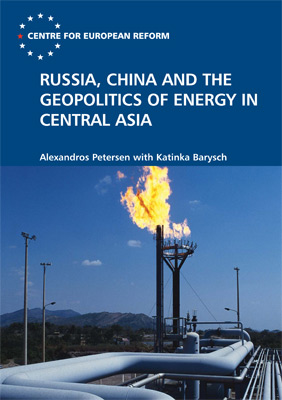Source: Centre for European Reform Report
 Energy has come to symbolize the geopolitics of the 21st century, reflecting countries’ diminishing reliance on military and political power. Today, energy is an instrument of geopolitical competition, like nuclear weapons or large armies were during the Cold War. The means of international influence have become more diverse and sophisticated, but the goals remain much the same: national security, power projection, and control over resources and territory.
Energy has come to symbolize the geopolitics of the 21st century, reflecting countries’ diminishing reliance on military and political power. Today, energy is an instrument of geopolitical competition, like nuclear weapons or large armies were during the Cold War. The means of international influence have become more diverse and sophisticated, but the goals remain much the same: national security, power projection, and control over resources and territory.
In different ways energy is fundamental to the rise of Russia and China as great powers. For Russia, possession of vast oil and gas resources fulfils a function similar to its nuclear weapons in the Soviet era. The post-1999 boom in world oil prices has underpinned Russia’s re-emergence as a great power. The combination of the country’s abundant energy reserves and fast-growing world demand for such resources has given Russia the opportunity to play a more influential role in global politics. When Kremlin officials speak of Russia being an “energy superpower,” they are really saying that it is back as a global, multi-dimensional power. Energy is seen not simply as an instrument of influence in itself, but as underpinning other forms of power: military, political, economic, technological, cultural and soft power.
Energy is no less vital to China, but from the opposite standpoint. China’s modernization and rise as a superpower depends on securing reliable access to natural resources. Beijing has responded to this imperative by making the worldwide search for energy one of foreign policy priorities. Just as Russia will rely on energy exports for the foreseeable future, so China will remain a net importer of oil and other sources of energy, such as gas and nuclear fuel. Energy and geopolitics are as closely intertwined in China’s case as they are for Russia, except that for Beijing energy is not an instrument of geopolitical ambition, but a key driver of an ever more assertive foreign policy.
From an energy perspective, the relationship between Russia and China should be straightforward. Russia is the world’s biggest hydrocarbon producer. China is one of the world’s biggest and fastest growing energy markets. Moreover, the two are neighbors, which means that energy transport is relatively straightforward, without the need for either risky sea shipments or pipelines that transit several countries. A long-term strategic energy relationship between the two looks not only commercially viable but almost inevitable.
European policy-makers have in the past reacted with concern whenever Russian leaders alluded to the option of “turning to the east” by redirecting oil and gas flows away from Europe and towards emerging markets in Asia, principally China. For the EU, which relies on Russia for a third of its oil imports and some 40 per cent of its gas imports, such a shift could pose a threat to energy security. The United States is equally concerned about an energy link between Russia and China, but for different reasons: it fears that energy could be at the heart of a strategic rapprochement between Beijing and Moscow.
However, as this report shows, the energy relationship between Russia and China is a lot more complex than their respective positions as producer and consumer would imply. In fact, the bilateral energy relationship between the two countries is remarkably underdeveloped. Their main energy interaction is an indirect one, through competition in Central Asia.
Alexandros Petersen is an energy security advisor to the Woodrow Wilson Centre in Washington DC.
Katinka Barysch is deputy director of the Centre for European Reform.
